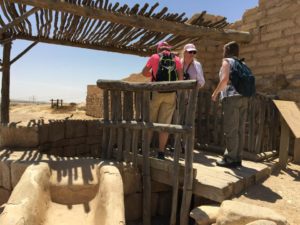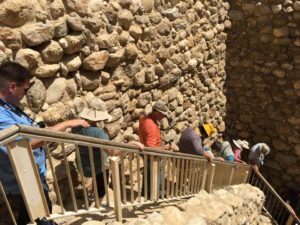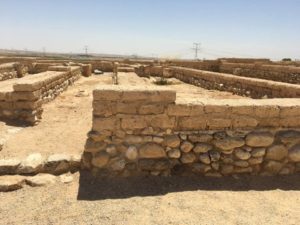 It was still our first full day of traveling in Israel. During the early afternoon we saw the ruins of a civilization that played a role of major importance in Bible History from the time of Abraham to the close of the Old Testament: Beersheba. First named by Abraham in Genesis 21, its name means “well of the oath,” thus named because of the oath made with Abimelech. (Photo below is an Iron age well in Beersheba, but very reminiscent of the wells of Abraham. It doesn’t take long to figure out in this Negev desert why there were contentions over the wells. Water is a valuable commodity, to this day, in this part of the world.) This was the wilderness where Hagar went to die (Gen.21). Both Isaac and Jacob lived there (Genesis 26 and 28) and it became a part of the inheritance of Simeon when the promised land was allocated to the tribes in Joshua 19.
It was still our first full day of traveling in Israel. During the early afternoon we saw the ruins of a civilization that played a role of major importance in Bible History from the time of Abraham to the close of the Old Testament: Beersheba. First named by Abraham in Genesis 21, its name means “well of the oath,” thus named because of the oath made with Abimelech. (Photo below is an Iron age well in Beersheba, but very reminiscent of the wells of Abraham. It doesn’t take long to figure out in this Negev desert why there were contentions over the wells. Water is a valuable commodity, to this day, in this part of the world.) This was the wilderness where Hagar went to die (Gen.21). Both Isaac and Jacob lived there (Genesis 26 and 28) and it became a part of the inheritance of Simeon when the promised land was allocated to the tribes in Joshua 19. 
Located in the center of the Negev desert, Beersheba is mentioned in scripture often as the southernmost point of Israel: “from Dan to Beersheba.” The ruins we saw were primarily those from the period of the divided kingdom; the period archaeologists call the Iron Age. Looking out over those wells they dug, seeing the four room homes they lived in and descending into a cool cistern (pictured below) built during the period of the Biblical divided kingdom had a way of making this Christian woman feel very connected to the people who formed the conduit through which the Savior would enter the world. 
 Significantly, I Samuel 8:2 tells us that Samuel’s sons, Joel and Abiah, were judges in Beersheba. Verse three tells us that they failed to walk in the way of Samuel, but rather took bribes and perverted judgment. This was in direct violation of Deuteronomy 16: 18-19. The Israelites clamored for a human king at this time, in a bold-faced rejection of their current king, Jehovah, using the depravity of Joel and Abiah as the catalyst excuse for rejecting God: Behold, thou art old, and thy sons walk not in thy ways: now make us a king to judge us like all the nations (vs 5).
Significantly, I Samuel 8:2 tells us that Samuel’s sons, Joel and Abiah, were judges in Beersheba. Verse three tells us that they failed to walk in the way of Samuel, but rather took bribes and perverted judgment. This was in direct violation of Deuteronomy 16: 18-19. The Israelites clamored for a human king at this time, in a bold-faced rejection of their current king, Jehovah, using the depravity of Joel and Abiah as the catalyst excuse for rejecting God: Behold, thou art old, and thy sons walk not in thy ways: now make us a king to judge us like all the nations (vs 5).
So the rejection of God as king and the establishment of a kingdom with a human leader, as God had predicted in the latter half of Deuteronomy 17, began right there in Beersheba with the perversion of the sons of Samuel. As I looked out over the ruins of a once great civilization, I could not help but think about the huge and negative ramifications that always occur when parents fail to instill within their children a deep and abiding respect for authority.
Of course, the back story to what happened in I Samuel 8, when the people used the rebellious sons of Samuel as their justification for rejecting God’s system of judges, is found much earlier in the book of 1 Samuel. It’s in chapter two, where the sons of Eli the priest were fornicating with women at the door of the tabernacle, greedily taking the fat of the meat offerings against the commands of God, and, in general showing they “knew not the Lord” (vs. 12). In chapter two we see some weak efforts of rebuke on the part of Eli toward his sons, but in chapter three, the Word plainly says that Eli “restrained them not” (vs 13).
It’s important to notice that this household, in which sons were not restrained, was the one in which Samuel grew up. What he learned about parenting, he almost certainly had to learn from Eli. So, when it was time for Samuel, himself, to display the backbone of a nurturing father, he failed miserably, and his failure was a significant part of the crystallization of a national rejection of the authority of God.
So there I was, looking out over Beersheba, thinking about this place where the sons of Samuel were taking the bribes. I could see the ruins of the ensuing kingdom that looked to a human head, rather than the Lord, as king. I thought about the remains of that horned altar found inside storehouse walls (storehouse walls and altar shown in photos ) in this spot–an altar made of well-dressed stones (an obvious center of idolatry); likely destroyed by Hezekiah or Josiah.I saw the well-defined rooms of houses; houses is which mothers sang lullabies and children played games, and I thought about the ultimate destruction that came upon them all in 701 B.C. at the hand of the Assyrians.
Lesson from Beersheba: Massive national declines and disasters begin in seemingly small ways when parents fail to instill principles of authority in their children.
How parents in America today need the lessons from Beersheba!
